Photo

(via GIPHY) When you sink into the couch because you realize that if the other Jordan Peele movie was on the syllabus you would have to watch that movie all over again as well
#giphy#us#get out#jordan peele#jump scare#stop motion animation#sunken place#the sunken place#social thriller#iconic horror scenes#iconic horror movies#jordan peele horror#get out social thriller#get out horror#sunken place horror#horror movie get out#sunken place get out#oscar winning get out#get out scares#daniel kaluyaa#get out scary
1 note
·
View note
Photo

I swear they cheated out of 1 of my quizz answers for this week.
0 notes
Photo

(via GIPHY) How it feel when a Rod Williams/Lil Rel Howard scene come on while you watching the movie!!!!!!!!!
128 notes
·
View notes
Photo

0 notes
Photo
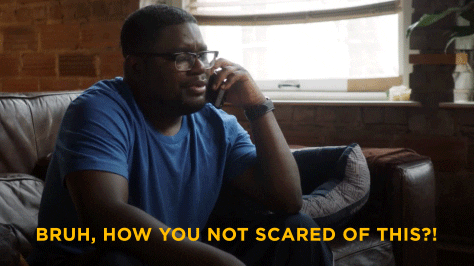
(via GIPHY) When you trying explain the depths and degrees of blackness in this movie
#giphy#no#horror#nope#confused#scary#scared#bruh#thriller#get out#jordan peele#lil rel#get out movie#lilrel howery#lilrel#how you not scared of this
13 notes
·
View notes
Photo

(via GIPHY) Bet Gabriel (Georgina killed this movie). Her acting was too clean. I’m still confused watching this movie in the first hour and fifteen minutes in because I keep forgetting that Georgina is Rose’s grandmother. Georgina blackness should be trapped in the sunken place. The motor functions and voice should all be in control of white people, but I’m still thinking that Georgina’s words and actions keep Chris interested in his cell phone long enough to realize that he needs to keep an eye out. I’m not sure if Rod was still on the phone or the battery just died, but either way this is the moment that I would’ve decided to roll bounce the fuck on out of that house
#giphy#gif#meme#smile#no#horror#black#nope#scary#crying#memes#cry#smiling#no way#nah#thriller#nein#get out#hell no#maid#black people#jordan peele#best gif#bad news#classic reaction#ร้องไห้#uh uh#funny memes#the help#fuck this shit
0 notes
Photo

Rose says a lot about the depths of psychopathic whiteness
0 notes
Photo
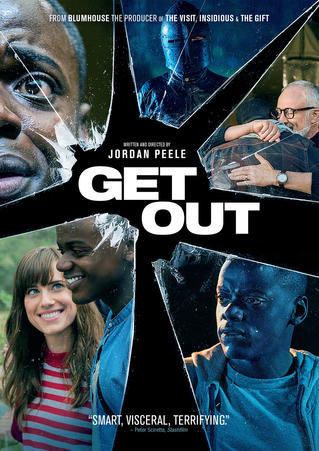
First of all, it should be know that Jordan Peele is a genius. It’s been 3 yrs since Get Out. I forgot that man not only got an Oscar, but also the first black man to get the category of original screen play. Now, that the feelings have been established, please someone tell me WTF is this phenomenon of psychological torture. Legit, I don’t even want to talk about this film even more than Gook. Afro-futuristic black Girl Magic throughout the martyrdom of black women is not my favorite concept. But you know what's worse, the paradigmatic negotiation of the field of psychoanalysis as a phenomenon of black mental health through quotidians notions signification. All the spoilers online, and final examination of the end to this post don’t a damn thing. This movie is just sinister for black people. This is without a doubt a HORROR FILM. This isn’t a thriller, or suspense, or a mystery crime drama with comedic elements. This is quite simply a horror. I say this because you didn’t watch the movie get out on the first viewing. You haven’t really watched this movie until the third time. This movie is an exploration of the cultural contextualism of black pathology. Something that no one in the right minds should ever conceive of doing without the imagination of working through the pain that comes with it. This movie is similar to the process of Wake Work by Christina Sharpe. A vivid scene of the constant notion of grief and death. Like the fact the most cliche nigga alive named Andre Hayworth is the blackest part of this movie. The number of No’s that Georgina said to Chris when she started crying. The slave auction bingo scene. The pandora’s box of Chris’ relationship to this white girl. The fact that every Lil Res scene is a constant awareness of a black audience. The fact that the coagula mind-transfer procedure is really a conversation for white liberals to recognize there own racism, but that in itself is a signifier so it means the process of coagulation is only more moments of contextualism. This movie is just one of the things that is beyond things that I need to stop immediately. LIKE RIGHT NOW. That’s not even the worse part. The worse part is that the movie title is call GET OUT. Like if you think I wanted to stay, would I even bother to watch this movie. The metaphor of GET OUT in itself is just such a great way to understand this mind of this movie. GET OUT is it’s own breathing legend that will be solidified in the memory of blackness and black people everywhere. It also got an Oscar so apparently everyone likes the movie. I have more thoughts about why everyone happy with just movie awards and an Oscar, but I digress before I get even more upset about the epistemology in and outside of this movie.
0 notes
Photo

(via GIPHY) The real fault of these articles is not that it does not explain privilege, but rather it does not take the quotidian far enough to understand the effects of white privilege reverberate no slip back into the imagination. Such a mundane white privilege after it is sad to be something that white people can come to terms with. Of course, there's no assumption that white people will ever fully stop their privilege however the articles lacks of the vacancy of white people to enforce new actors are even more examples of privilege. The active choice of whiteness and white privilege can also be just as dangerous as believing that white privilege no longer exist. However white privilege is just as transformative of whiteness and anti-blackness. Now here, I am very tempted to call white people psychopaths and if you need the literature on that you can go read Dr. Bobby Wright's book on the clinical psychologist of the 1980's. This book release is a medical book about the psychopathic tendencies of racial ideology. However, that is for personal use. My second author that I will describe here that is Dr. George Yancy, who in 2005 released a book titled Whiteness and the return of the black body. While I will not directly quote any of Yancy's arguments he does make a pretty damning case for whiteness and white privilege are almost dynamically interchangeable whenever given the history of the phenomenon of slavery and anti blackness. Again a conversation for another time. What I really want to enunciate here is the juxtaposition of the conversation of different types of privilege. In general, we have made some conversation here, but I'm going to expand on what I mean by the word privilege. The words white or black continue to create a tradition behind terminology/syntax that are uniquely nuanced. When I discuss privilege I am talking about the ability to make a self-serving invitation to a specific prototype of behavioralism. This is still within the realm of ontics and ontology without care of the consequences of one's actions or even an ignorance of the consequences of one's action.
0 notes
Photo

(via GIPHY) I'll start with the more divisiveness one. "Black privilege" is a term coined by Charlemagne the god of The Breakfast Club radio program. Charlemagne's book writes that understandings of the intra-communal politics of black people to act on the internalized pathology. The problem with this discussion of black privilege is that it becomes so contextual that the credentials of Charlemagne Tha God, a radio show host, to speak to the dynamics of how black people come to discover their privilege is humorous. Now this is to not say that black privilege cannot be a thing, especially in connecting to other complex social system such as race, class, gender, culture, and sports. However these topics are highly contentious for only black people and even more these are definitely navigating borderline pathology in ways that continue to exemplify the same judgment of the status quo. Allowing for, the reinterpretation and reorganization of these complex systems within the black community. Also, it uniquely ties down and prevents radical thinking about the new types of systems that can be put in place or should be put in place to avoid the reformation of systemic oppression. Even the conditions of white privilege buy into spray painting black problems as uniquely and already tied to the white imagination. But that's just Charlemagne. It's important here to analyze how white privilege comes to understand a white reality. Simply, white privilege is particularly true of notions of psychology and not just speculative psychology. Authors that are Sigmund Freud, Nietzsche, Foucault, Derrida, and even the Hagel's is that their theory of relationally are all implicit of an ontic and ontological descriptors of an ethic that must exist. However, even when I implying that ethics are contextual is always a condition that is at best ambiguous. Now, this is not even a dualistic or even a triple methodology that I will invoke from Dubois and Fanon. Instead, I would prescribe anti-ethical relationality dispells and separate the mysticism of white psychological. What separates Black scholarship from White scholarship are the ways that they embrace the cliche of a radical toxicity about the androgynous faith of a black Collective. That being said, it is extremely unfair to categorize the entirety of the black experience through a human existence which the only guarantee is to live or die. However, if Dave Chapelle's last monologue on SNL is any indicator of how people of all backgrounds can come to understand blackness it's there. Whenever you have troubles and complications with learning how to understand that you may never become a complete self you should come by and gain some "n****" lessons from a peoples who have had to answer and live through that question their entire lives. I'll this post with one of my personal favorite quotes that I have coined about blackness. It says "Blackness is still bright even with no sun because black boys and black girls look blue and lavender under the moonlight". This is definitely a long way to make up for my lack of a previous discussion post. I'll even recognize this post is my own brand of narcissism, however, I only pray that I'll live to find out what that narcissism even means for me and every facet of a ethnic/ethnicity with and for black people.
#giphy#food#chicken#black woman#minnie#fried chicken#the help#fried chicken just tend to make you feel better about life#minnie jackson
0 notes
Photo

(via GIPHY) It’s interesting the way the film deal with notions of white femininity within the movie. There are ugly moments in everyone, it’s about how we get back up that matter. I'll start by adjusting my mood for this conversation not only because this is a very divisive context, but the influences of the rhetoric and moments that this article attempts to address has already run through some of the context of this class. However, this is not where I wish to start. I'll begin by tracing the areas of outdated or rather incomplete nuances and tensions that are within the rhetorical packaging white privilege. First, is the statement in the article by Francis E Kendall, Understanding White Privilege when she says that it is very visibly to see privilege for who it was not granted. When of course, these conditions can also be internalized. Conditions of white privilege are not just subjected to notions of white people nor can that you know what white privilege announces even as a precursor about ideological whiteness. Simply, White privilege operates in tandem with current epistemology, which is that it can be transferable to any conditional ethics. More importantly, different backgrounds that can embrace this cultural immersion are just as effective as white people are of ending write privilege in it's totality. More importantly, there is a focus of this article on the particular systematic inclusion and not towards the end if this privilege. There is a realistic interpretation about how interpersonal level work operates, however, the highlight for this discussion post will rather be on how the quotidian or at least how the mundane micro aggressions in both these articles are the real life blood of making white privilege and whiteness a culture of inclusion. Taking note here, of the idea of "The White Man's Burden" is that white people are allegedly forced to make other races included within their paradigm because they were predestined to already appointed themselves the Dictator of all other people. Now this culture of inclusion is different from the "culture of power" for the article in a very subtle way. The culture of power assumes that whiteness must enforce power in order to gain positions of superiority because it is in fact their privilege to make annunciations of right to refuse the learned traditions around white people. However, the culture of inclusion, would entails that the libidinal framework for how white privilege perpetuates, itself, is indicated at the psychic level where the informed intentions are in fact insidiously enacted through the belief of rationality. Where to be rational is to be white; to be logical is to be white, to understand decision making, praxis, theory, language, problem solving, enlightenment, selfhood, linear time, and even notions of personality are apart of cosmological white privilege. These conditions will tell you that to "manifest destiny" is always already a white conversation where agency itself is not void of any particular responsibility but rather a playground in which the forethought of white privilege is always already existing.
2 notes
·
View notes
Photo
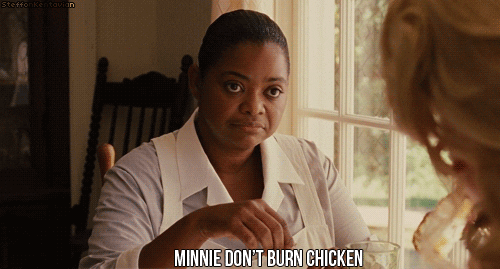
(via GIPHY) There’s an art to frying some chicken.
#giphy#drama#emma stone#viola davis#inequality#octavia spencer#the help#cicely tyson#servitude#blackthingz#just sayin
13 notes
·
View notes
Photo

The Help: This is powerful, but I don’t know how to fell about this Mammy stereotype. Like I’m still very worried for Alibeen at the end of this movie. I’m glad she confidence in herself. I just want the confirmation, ya know! And I can’t leave without doing this, but this pie tho. THIS PIE THO!!!! Minny must have given Viola Davis all the strength to overcome because someone definitely got away with murder. Corny, but I don’t even care right now! THIS PIE THO. NUFF SAID. I ,truthfully, don’t know where to begin or end this response. I believe the trend will be to focus on the surreal and hyper-specific practices in which minority communities engage with the law. The undercover realization being that "mass incarceration" affects more than the "black folk”. I won’t make this an FYI about how this discussion is literally structured by the history of black people. The structuralist in me has long learned that the epistemology of black antagonism sutures the cultural emersion that permeate social interaction. Meaning that the macro and micro aggression towards blackness have become universal. However, I will participate in some of the discussion of the text to see if browny points are possible. My list consist of; Reaganomics as a consistent criminalization tactic since debt peonage, rehabilitation and recidivism are the worse in the US, stigmatization of criminal is born from the 13th Amendment (which applies to slaves and there descendants), fugitivity is marked on the corporal signifiers of black flesh, not to mention that the state level incarceration has impacted the majority of black population. I’ll end here with special attention to the two black women that have made significant representation for attempting to end a cycle that affects black men most disproportionately. I do this because in and outside this discussion board, black women continue to speak up for black men across the spectrum. If the recent news, of Breonna Taylor, has taught me anything it’s that this movement of imprisonment has re-energizing it’s pull to black women as well.
0 notes
Photo
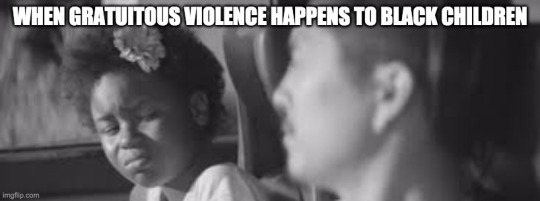
I was just like for the tragic deaths of black children to end :)
0 notes
Photo
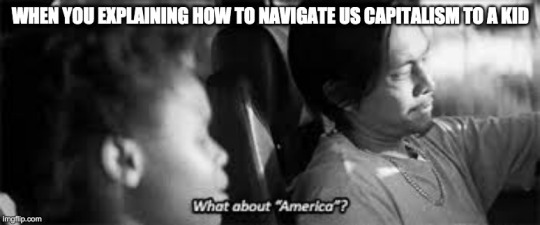
In the movie, Gook, the character Kamilla must navigate the undercommons of black street codes after the Rodney King court decision during the first bush presidency. The LA riots of 1992 exposes themes of American culture, exceptionalism, and appropriation. More importantly the film deals with inter-communal tensions between minority groups. Notions of kinship and prejudice are specifically addressed in the movie. Asian Americans and black people face both racist and stereotypical prejudice from American standards of success in achievements towards social mobility. These conditions have internalized negative outlooks that have only lead to more debates about social difference. Exclusion and racism tend to justify oppression towards minorities even when diverse social groups come from low economic backgrounds. The conversations for the experience of Asian Americans and the black community nuances the effective an implicit themes of racism, sexuality, gender, American politics, and even ethics. The film explores pathological behaviors through the character Kamila as she encounters radicalization during 1992. Gook is released in twenty seventeen, however, the questions of implicit and explicit racism are conversations that apply to all minorities during the first era of the Bush Administration. Kamilla's perspective gives the film’s audience a chance to engage the after effects of tragic deaths on the history of xenophobia an anti blackness during this generation. The scenes that include Daniel, Eli, Keith, and Camilla interrogate the seriousness of the dynamic socialization of race as a social construct. However, the behaviors and attitudes in all these characters recognize the need to heal from these stereotypes because they assimilate to vague notions of American values to create pathological judgements with black people, specifically.
1 note
·
View note
Photo
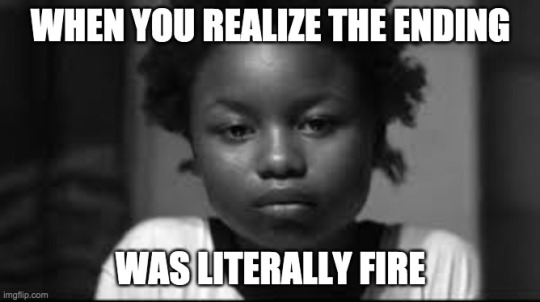
The scenes where Camilla dances inside a woman shoe store, in a liquor store parking lot, or outside the burning of her former headquarters build upon the joy and pain of being black from a child's perspective. While the film does explore aspect about the "myth of the model minority" for Asian Americans the focus is on Kamilla’s story. The tragic nature of Kamilla's death not only reveals some unexplored tensions for the martyrdom of black women, but also the interpersonal politics for ethnic differences. The "American Dream" has led to pathological nationalism and nativism. Mr. Kim towards Camila buy into vigorous judgements of character off of a single moment. On the other hand, Kamilla has received life lessons and unity from other Asian Americans representation from Eli and Daniel. These characters have been influenced by the "street codes" and are by-products of the "crack codes" from the history of the War on Drugs. Language of "welfare babies" created disparities within the black community for police brutality and criminalization. From Kamilla's perspective the loss of her mother, her "sleeping" father in the living room, ditching school when told not to, hiding money in her sock, stealing money from her older sister, accepting brand new Air Jordans are all lessons from a pattern before her generation. Kamilla makes poor decision after poor decision, however, this is not a simple situation of "if you'd knew better you'd do better”. Kamilla's experience is exposed to violence beyond her control as Kamilla's brother is an accomplice to criminal activity and also physically assaulted by Korean-American store owners for stealing. Kamila's school is alogical conclusion for Kamila to spend her time. Unfortunately, the movie’s storytelling implies that schooling will not teach her how to navigate the streets around her. As Kamalia decides to work for Eli and Daniel at her headquarter, the shoe store, she develops more than just an excuse from her homework. From Kamilia's perspective finding a job to pay for her and her family's bills takes priority over graduating middle school. These truth about street codes ring true because Daniel and Eli know full well how dangerous life is for their community. In Paramount, California during “Rodney King’s beating” the street are never safe as you can get jumped gratuitously. Kamilia’s mother death is even connected to the Korean American family of the store where she goes to works for. This should be enough to stress the importance of finishing school. However, Daniel and Eli choose to indulge Kamilia because of uncertainty of her safety. Furthermore, Daniel and Eli begrudgingly let Kamila volunteer at their store because they know the extent go how hard social mobility has become in America.
0 notes
Photo

Gook: Okay, I wanted to avoid as much as possible going into the signifiers of each character. First, I want to say that this ending was THE WORST, but only at first. Don’t get me wrong, I get the reasoning and even more "the work” that questions the society from Kamila’s passing. However, this cinematic cliffhanger right at the edge of the examination of the implicit socio-normative ethics that mystifying Asian American experiences left me flaming mad. This movie was done in 2017, but I’m still screaming “C’mon” at the end of this movie because there is just so much conversation to be had after the ending. Both the theme and plot are just left to the imagination and it ticks me off. This is definitely hyper-attentive and (probably) unfair of me. Anyway, the main discussion here that runs the message of the movie is this “Myth of the Model Minority” and the African American communities. Essentially, that Asian Americans face both racist and stereotypical prejudice for an arbitrary standard of success and social mobility. In other words, American Asians are targeted for notions of achievement as a "social status” in American. Both using racism against and to justify exclusion of other minority groups even when the status doesn’t exist (i.e the myth behind the "myth of the model minority”). Kamilla is just black girl magic, that is all. In all seriousness, the way that violence effect communities of color is so painful to see on screen. We are just with Afro-futurism at the end of this movie and I’m just like……..sure, I guess that works, maybe? Also, Imma just throw this out there. It’s definitely fuck Mr. Kim bro!!!!
0 notes